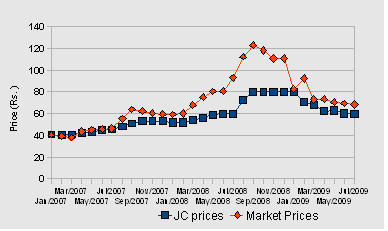Fourth
Critical Studies Conference
"Development, Logistics, and Governance"
Name
of the Session V:
Economy and Governmental Rationalities
![]()
Full Paper
Abstract
The planning of logistics for development, especially for industrialization, was a shared characteristic of both socialist and capitalist economies for a substantial part of the 20th century. This logistical planning, starting with India's First five Year Plan (FYP), was also an essential part of an inclusive discourse, long before the word inclusive became fashionable, and has been a hallmark of the developmental ideology of the Indian State.
Is the idea and use of logistics very different between capitalist and socialist development? The end objectives of each model is different, but at least in the Indian context, the argument here will be that the inclusive character of the socialist model is just as debatable as that of the capitalist one, especially if one takes into account the role of politics in the process.
Let us just consider one example: the telephone, or communication networks in general. In India’s controlled-mixed economy with its socialist pretensions, the telephone was a luxury product, available mainly to the well connected, irrespective of the sector in which they worked. The liberalization of the Indian telecommunication system revolutionized the telephone and democratized communications. A similar argument can be put forward for road connectivity, wherever it happened. Consumption logistics is also an important case which affects urban development and its logistics.
The enabling character of logistics, as compared to the other characteristics mentioned in the concept note, will be the principal thrust of the paper.
Bionote
Basudeb Chaudhuri : Economist trained at Presidency College, Kolkata, the Indian Statistical Institute, University of Paris I Panthéon Sorbonne. Associate Professor of Economics and former Vice President of the University of Caen, Normandy. Currently on lien in Delhi as Director of the Centre de Sciences Humaines, a research unit of the French External affairs Ministry and CNRS. Expert for Erasmus Mundus and the European Commission. Published : Frédéric Landy et Basudeb Chaudhuri (co-edited 2004): “Globalization and Local Development in India: Examining the Spatial Dimension” , Manohar Publishers – Centre de Sciences Humaines, New Delhi . Contributed articles on the Indian economy in ”Oxford Companion to Economics in India”, edited by Kaushik Basu, OUP 2007, and to C. Clementin Ojha,C. Jaffrelot, D. Matringe, J. Pouchepadass (edited.), Dictionnaire de l’Inde, Paris, Larousse, 2009 and in other international journals and books. Areas of interest: developing and emerging economies, public economics, institutional economics and political economy, globalisation.
<%'-----------------------------Start Module B-------------------------------------%>
![]()
Abstract
The Just Change India Producer Company (http://www.justchangeindia.com) has been involved in facilitating direct trade between different producer groups in India. The aim of the company is to facilitate producer groups to take over the roles of intermediation currently played by traders in order to sell their produce while at the same time sourcing products from other similar groups. One of the key obstacles issues that JCIPC has faced during this process was the logistical hurdle in sourcing sufficient quantities of goods and reaching the same at an affordable price to the final consumer.
One of the key learnings of the past four years has been that there is a sufficiently large margin on most key producer goods for groups to invest in buying and holding commodities. Holding the commodities to retain its freshness require keeping the commodities in cold storage and lifting these commodities for sale in the market periodically. The microscopic intervention that JCIPC has made has ensured a marginally better price at the end of the consumer as well as a better price for the consumer especially at when price spikes take place in the open market (see the period between June 2008 and January 2009) in the graph below.
Price of Coriander: A comparison of market prices and JCIPC prices

In this intervention, JCIPC was able to sell most of its stock at the time of the price spike despite the fact that the rest of the time, it was probably not remunerative to bring the commodities to the market due to the logistical cost involved. The key reason why this was possible was because the scale at which JC operated, it was possible to enter the market and sell the small quantity of stock held without having a key influence on the market price.
However, if one has to make a substantial impact on farm income it is necessary to change the nature of the supply chain that presently is weighted heavily in favour of the owners of private capital. Producers will continue to struggle to earn a livelihood until key public investments are made in the supply chain. In the agricultural market, the key logistical costs are comprised of the cost of cold storage as well as the cost of transporting the goods to the final market/ consumer. Reforms in the present system that allow for growers to store their producers at conveniently located and possibly community owned storage centres and access markets through a network of producers will be crucial in ensuring that farm income can be substantially increased not through higher prices, but by taking greater control of the supply chain.
Bionote
Jacob has been working with Just Change India Producer Company for the past four years. As a part of the work, he has been setting up systems to link producer groups with each other in order to create a network that can buy and sell commodities among each other. Jacob has an LLM from the University of Warwick and his first degree is in Economics from the London School of Economics.
![]()